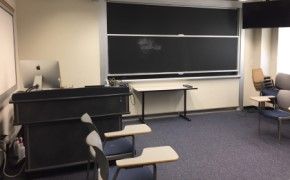Instructor Insights pages are part of the OCW Educator initiative, which seeks to enhance the value of OCW for educators.
Instructor Insights
Below, Professor M. Amah Edoh describes various aspects of how she taught 21G.026 Global Africa: Creative Cultures.
Academic work isn't separate from life, and it's not something that's only accessible to some people. We are always theorizing. Making sense of our experience is about theorizing.
— M. Amah Edoh
Curriculum Information
Prerequisites
There are no prerequisites for this course, but French language concentrators should have taken 21G.028 African Migrations or have the permission of the instructor.
Requirements Satisfied
- HASS-H
- 21G.026 can be applied toward a Bachelor of Science in Global Studies and Languages (French Studies).
Offered
21G.026 was offered for the first time in Spring 2018.
Assessment
Grade Breakdown
The students' grades were based on the following activities:
 20% Reading responses (weekly, 10 total)
20% Reading responses (weekly, 10 total) 20% Presentation of readings
20% Presentation of readings 20% Paper
20% Paper
 30% Final project (20% project, 10% presentation)
30% Final project (20% project, 10% presentation) 10% Class participation
10% Class participationStudent Information

Breakdown by Year
About 2/3 sophomores and juniors; about 1/3 first-year students and seniors
Breakdown by Major
Many engineering and computer science majors; a few humanities majors
Typical Student Background
About half the students were Africans from the continent or first-generation Americans of African background. Many of the non-African students were going to be working in Africa during the summer or had recently spent time there.
During an average week, students were expected to spend 12 hours on the course, roughly divided as follows:
In Class
- Met once per week for 3 hours per session; 12 sessions total; mandatory attendance.
- Students participated in active discussions, listened to weekly samples of African music, and delivered presentations of their final projects.
Out of Class
- Readings in preparation for class sessions
- Attending theatrical performance and film screenings
- 10 weekly reading responses
- 5-page analytical paper
- Creative final project
Semester Breakdown
| WEEK | M | T | W | Th | F |
|---|---|---|---|---|---|
| 1 |  |  |  |  |  |
| 2 |  |  |  |  |  |
| 3 |  |  |  |  |  |
| 4 |  |  |  |  |  |
| 5 |  |  |  |  |  |
| 6 |  |  |  |  |  |
| 7 |  |  |  |  |  |
| 8 |  |  |  |  |  |
| 9 |  |  |  |  |  |
| 10 |  |  |  |  |  |
| 11 |  |  |  |  |  |
| 12 |  |  |  |  |  |
| 13 |  |  |  |  |  |
| 14 |  |  |  |  |  |
| 15 |  |  |  |  |  |
| 16 |  |  |  |  |  |
 No classes throughout MIT
No classes throughout MIT Class meeting
Class meeting Paper or reading response due
Paper or reading response due No class session scheduled
No class session scheduled Class outing to theater
Class outing to theater Project presentations
Project presentations


 Room 1 of 1
Room 1 of 1 